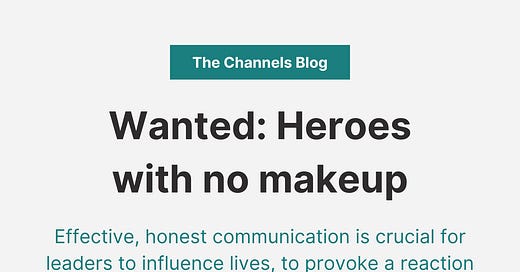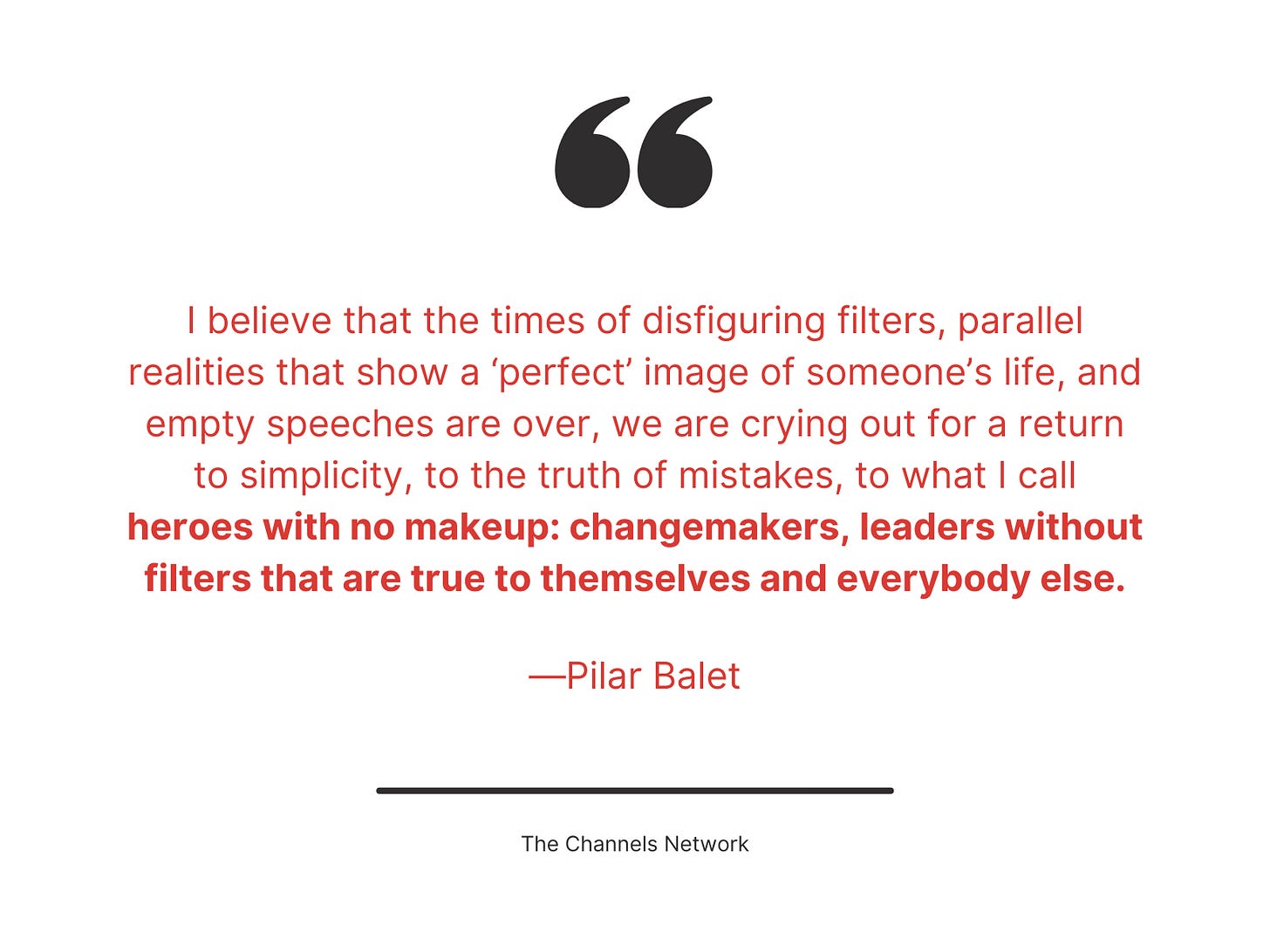Wanted: Heroes with no makeup
Effective, honest communication is crucial for leaders to influence lives, to provoke a reaction that will drive positive social impact.
By Pilar Balet, journalist and international comms consultant, also founder of La mar de gente Comunicación. Originally published in Spanish on ethic.es: ‘SE BUSCAN: HÉROES SIN MAQUILLAJE.’
Nowadays, distrust and disinformation rule our lives. To be heard, and more importantly, to provoke a reaction by knowing how to communicate is indispensable. Today, communication is to the social impact sphere what blood vessels are to the heart.
The way we think shapes the destiny of institutions, norms, and values that structure our societies. According to Berkeley’s professor Manuel Castells, social science scholar and Spanish former minister, the main power struggle is the battle to build meaning in the minds of people. If you get to build those meanings, you are able to influence behaviors and shift them toward new conducts and visions. But who can get into our minds and influence our actions and thoughts?
We live in times of maximum uncertainty when it comes to communications. Over the last 20+ years—from the eruption of the internet to the attack on the Twin Towers—the foundations of a new, global society have been laid. A society in which boundaries have disappeared, and scare-mongering deepens the divide between ideologies.
We are living in times in which, thanks to the pandemic and 40ºC springs, climate change cohabits with us, and the word sustainability governs all corporate strategies. A word that loses substance from so much handling and whose meaning belongs to too many. In an almost inevitable way, this fate will be shared, in spite of our regret, by another term of which I am especially fond: social impact.
For almost twenty years, I have been working on communications strategy in organizations for social impact. Organizations whose mission includes the creation of positive social change. And for the last ten years, I have been lucky enough to work and learn with some of the best experts in impact measurement, including Sophie Robin, Impact Director at Stone Soup Consulting and co-founder of the Spanish association ESimpact. These are professionals who are determined to find the truth of the processes which generate change and understand how, why, and who the millions of euros invested in social projects benefit (or don’t). This has been a fascinating apprenticeship that has allowed me to understand the inherent challenges and difficulties of these processes but also the immense beauty that emanates from seeing that positive change is possible.
Thanks to all these years of contact with impact measurement and the need to find the truth behind social change processes, I have been able to dig deeper into the role of communication as a catalyst of positive social impact, just like an electric current that transmits the meanings that Castells referred to, and take the processes of social change to the next level.
Communication at the heart of our strategy
Nowadays, distrust and disinformation rule our lives. To be heard and, more importantly, to provoke a reaction by knowing how to communicate well is indispensable.
Strategic communication is capable of influencing, driving, changing, and improving everything it touches. If we include it in the design phase of the different social change processes, it can change the focus of a project, integrate new, key allies, or widen its reach, among other things. On the other hand, if we only include it in the implementation phase, it would be like a bird trying to fly with no wings. It will take a few steps but will never leave the ground.
Communication aimed at social impact can not only improve sales, but also recruit more donors, strengthen your position, or influence decision-making. It can also include more people in the conversation by making more material accessible, fighting hate-mongering, being a loudspeaker for under-represented groups, fostering collective intelligence, improving transparency, or even strengthening bonds within communities. Communication today is to social impact what blood vessels are to the heart.
As we can see, there are many ways communication can lead to social impact. However, much work is still to be done before the executives of social organizations take this reality on board and start to give their communications people more prominence, or even include people who master the art of communication in their technical teams. We need to re-think our communication to take it to the next level, so our social impact goes further, too.
Knowing how to communicate well is a superpower
The Communications Observatory for Climate Change in Spain recently reported that business leaders are gaining visibility in the public debate about climate change along with scientists and politicians. Their voice joining the conversation about a crucial subject that concerns us all is, without doubt, good news. However, it is interesting that we journalists, key stakeholders in the context of communications for social change, always ask others to explain their actions but, as we say in Spain, “are sometimes incapable of seeing the beam within our own eyes”.
When will we become conscious of and responsible for the power we have in our hands? It’s inspiring to see the steps taken in Spain by Alfredo Casares on solutions journalism, Fundacion por Causa, or Maldita.es, but many other lines of work can be developed so that we communications professionals can redirect our superpower—our capacity to influence—towards social impact targets however small they may be.
There was a time when journalists and comms departments were the ones leading the conversations with readers and buyers. But now, the truth is that journalists are no longer the only ones capable of telling stories. With the arrival of the internet, the so-called “communication paradigm” changed. Instead of being one-way and on smaller scales, our conversations are large-scale and two-way today. We all communicate (you too!), but those who communicate well are the ones who are able to really enter our minds.
To quote Castells again, they are the ones who influence our emotions by waking our fears and enthusiasm and carrying us to collective action. For this reason, it is urgent that we strengthen the ability of those leading the change to communicate; for them to be heard, inspire, and exercise a positive influence on the attitudes and habits of the many.
At this point, I would like to underline the importance of the value of honesty, the pillar that needs to support our communication for social impact. It has taken its time, but today’s society and its priorities have changed. I believe that the times of disfiguring filters, parallel realities that show a ‘perfect’ image of someone’s life, and empty speeches are over, we are crying out for a return to simplicity, to the truth of mistakes, to what I call heroes with no makeup: changemakers, leaders without filters that are true to themselves and everybody else.
Our audience is prepared. We are human and make mistakes. Executives and communication professionals who try to “protect” their companies or organizations from the outside world, fearful of showing too much and distrust of communications departments, or even journalists, can leave that ‘gatekeeper syndrome’ behind and share information in an honest and engaging way, accessible to as many as possible.
By being honest and showing that we—as communicators, as humans—are not infallible and can learn from our mistakes, we will generate confidence in ourselves, in our teams and organizations, and in our processes.
We communications strategists know that the important thing is not what we tell people but the response it provokes in our listeners.
Communication is, as Edward T. Chambers would say, the power to influence the lives of others, to get into their minds and provoke a reaction. We better make sure that those who control this superpower are capable of taking us to a better, more honest, fairer, and more habitable future for all of us.






